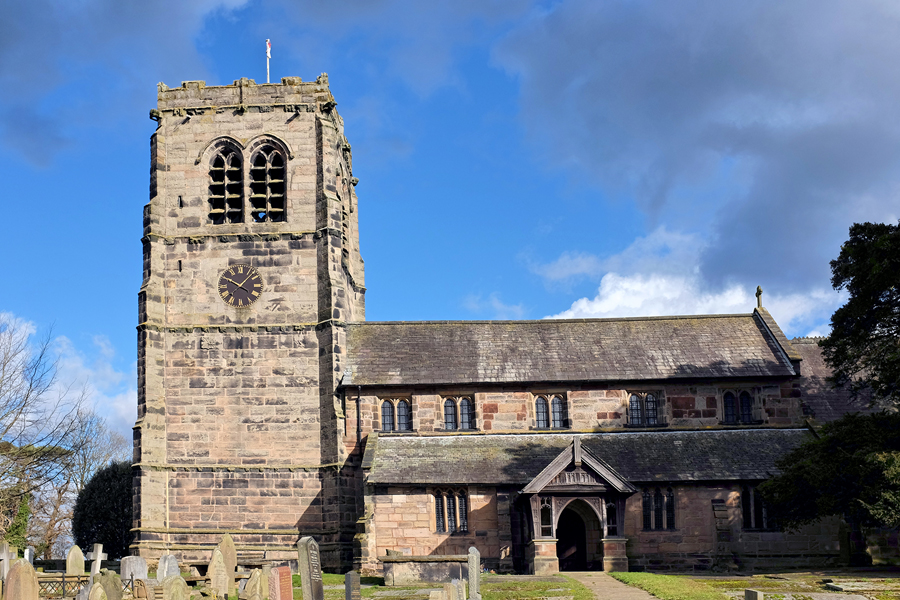 |
| St. Wilfrid's, Mobberley, March 2015 |
 |
| St. Wilfrid's, Mobberley, March 2015 |
 |
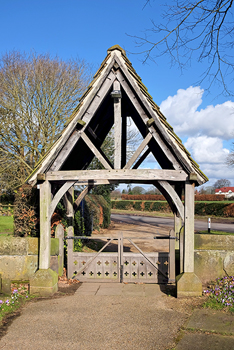 |
|
| The North Door | The Lych Gate | |
 |
 |
|
| Sedilia and Piscina in the Chancel | The South Porch | |
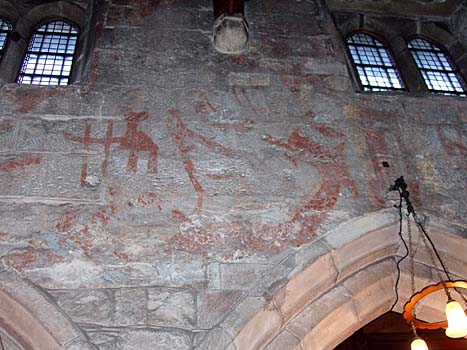 |
 |
|
| Painting on the north wall of the nave | Mobberley in early Spring |
Mobberley's church is dedicated to St. Wilfrid, an Archbishop of York, who died in 708 AD. During restoration work in 1888, evidence of a pre-conquest church was uncovered. It is not mentioned in the Domesday Book but much of Cheshire was laid waste by the Normans prior to the survey. The first documentary evidence for the church is in the reign of King John (1199-1216) when Patrick de Mobberley founded a small priory of Augustinian canons to work at the church. The oldest parts of the current church date from 1245. An inscription on the tower shows that it was rebuilt in 1533 by John Talbot of Grafton who employed Richard Plat as his master mason. Masons' marks within the tower show that it was built by the same men that worked on the tower at Nether Alderley. A Green Man can be found on the tower. The chancel and vestry were rebuilt in 1888/9. The lych gate has been repaired recently; it was built in 1901 from timbers recovered from an old school.
The church was used and served by the Mallory family, as described in the article below. This family provided one of England's greatest heroes. George Leigh Mallory and his climbing partner Andrew Irvine were on the British climbing expedition to Everest in 1924. The two were last seen on 8 June when they appeared to be to going well for the summit after leaving the final camp, at a height above 28,400 feet, but they did not return. George Leigh Mallory's body was found by an expedition in 1999 and recognised by the name tab in his clothes and letters in his pocket. It is not known if they reached the summit. There is a stained glass window commemorating Mallory at Mobberley church. It shows left to right three mythical figures: King Arthur, St. George and Sir Galahad.
Although I don't have a documentary source, there is a possibility that the large stone just outside the lych gate may be a "resurrection stone", i.e. a heavy stone placed on top of a burial to discourage body snatchers who stole bodies to sell to anatomists. There is a good example at Dean Row Chapel.
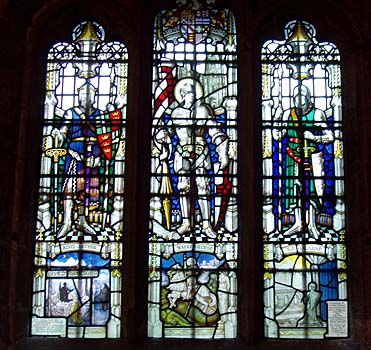 |
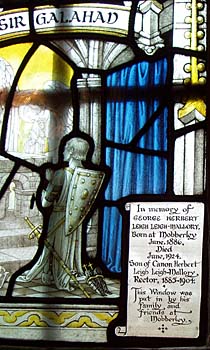 |
|
| George Leigh-Mallory commemorative window | Detail from lower right of the window |
The panel in the lower right of the window reads "In Memory of George Herbert Leigh Leigh-Mallory, born at Mobberley, June 1886, died June 1924, son of Canon Herbert Leigh Leigh-Mallory, Rector, 1885-1904. The window was put in by his family and friends at Mobberley"
The mountaineer's brother became Air Chief Marshall Sir Trafford LeighMallory who was a leading figure in the Second World War. He too met a tragic end.. There is a brass plate in the church which is inscribed:
In Proud and Loving Memory
of
Air Chief Marshall Sir Trafford Leigh Mallory KCB DSO
and his wife
Doris Jean
Killed in an aeroplane accident in the Alps
On November 14th 1944
Their bodies are buried at Rivière d'Allemont, France
Where the wreckage was found on June 15th 1945
Mobberley Old Hall was built in the early 17th century and altered in 1686. It is brick with mullion and transom windows. The new hall dates from 1848. Mobberley remained the seat of the Mallory family until 1900 when it was sold by the Rev. Herbert Leigh Mallory, father of the mountaineer.
Sources:
Raymond Richards in Old Cheshire Churches
Ian May's lectures at Wilmslow
Guild on Old Cheshire Churches.
The Mallory family has a long connection with Mobberley. Many were university graduates and Anglican clergy. Thomas Mallory, Dean of Chester was a younger son of Sir William Mallory of Studley in Yorkshire. He purchased the advowson of Mobberley in 1619 from Andrew Carrington of Mobberley. His purchase also included the manor house on the site of the old priory. From the 13th century, the manor had been divided into two halves or moieties. In 1631 Thomas Mallory purchased rights to the other moiety that were in the hands of Sir John Talbot, Earl of Shrewsbury.
The family ran out of male heirs in 1664. One of the daughters married a kinsman, possibly her second cousin, also named Mallory. In the early 19th century the family ran out of male heirs again. The heiress, Julia, married George Leigh in 1832 and he took the name Mallory. This couple had two children, George, who died unmarried and Harriet. However, Julia died young and George married a second time producing a further seven sons and five daughters. These children were unrelated to the original Mallory family but the eldest son, Edward Leigh Mallory, born in 1837, then succeeded. His younger brothers are shown in Ormerod with the surname Leigh. There is an article The Mallory Family of Mobberley in Cheshire Notes and Queries, N.S., 8, 1908-11, 129-139 covering the 16th and 17th centuries.
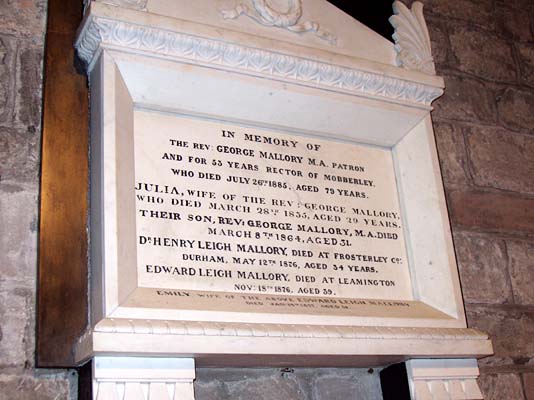 |
In Memory of The Rev: George Mallory M.A. Patron and for 53 years Rector of Mobberley who died July 26th 1886, aged 79 years Julia, wife of the Rev: George Mallory, who died March 28th 1835, aged 29 years. Their son, Rev: George Mallory, M.A. died March 8th 1864, aged 31 Dr. Henry Leigh Mallory, died at Frosterley Co: Durham, May 12th 1826, aged 34 Edward Leigh Mallory, died at Leamington Nov 18th 1876, aged 39 Emily, wife of the above Edward Leigh Mallory Died Jan 14th 1877, aged 31 |
Sources:
The family tree is adapted from that given in Ormerod,
2nd Edition. He mentions his sources as Sir Peter Leicester, Rev. J. H. Mallory
and Rev. George Mallory.
Other information on the church from Old Cheshire Churches by Raymond
Richards and the monuments in the church
BBC film on the 1924 expedition to Everest.
I would like to thank the people who showed an educational party from Wilmslow
Guild round the church when we called unexpectedly on a Saturday afternoon
in November 2004.
Back to list of families
Introduction to Cheshire Gentry
Links: